Celebrating 30 Years of the Beijing Declaration: A High-Level Multi-Faith Reception on Gender Equality and Empowerment
CSW69 Beijing+30 Reception | March 2025
On Monday, March 10th, the Gender Working Group of the Multi-Faith Advisory Council (MFAC), alongside the Joint Initiative for Strategic Religious Action (JISRA) program with partners Mensen met een Missie, the Network for Religious and Traditional Peacemakers, Tearfund and the Faith to Action Network, ACT Alliance and the International Partnership on Religion and Sustainable Development (PaRD), held a High-Level Multi-Faith Reception to mark 30 years since the 1995 Fourth World Conference on Women and adoption of the Beijing Declaration and Platform for Action (Beijing+30).
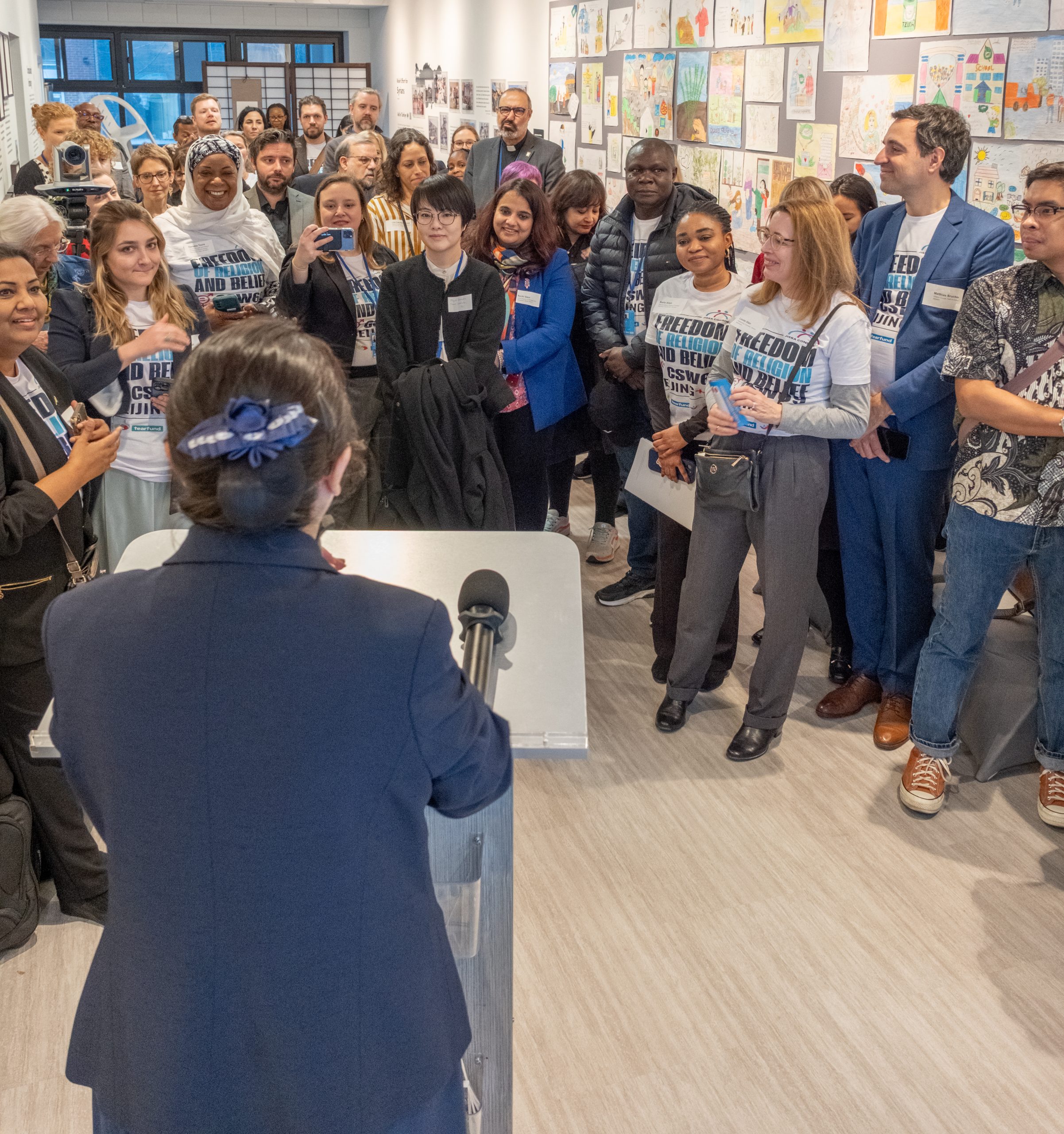
Debra Boudreaux, CEO of the Buddhist Tzu Chi Foundation and Co-Chair of the Multi-Faith Advisory Council (MFAC), welcoming attendees of the High-Level Multi-Faith Reception. March 2025.
The reception provided perspectives from key United Nations, government, and faith actors on the implementation of the Beijing Declaration and Platform for Action, assessing challenges to the achievement of gender equality and the empowerment of women, and contributions towards the full realization of the 2030 Agenda for Sustainable Development.
The reception began with a warm welcome from Debra Boudreaux, CEO of the Buddhist Tzu Chi Foundation and Co-Chair of MFAC. Following, Ani Zonneveld, Founder and President of Muslims for Progressive Values (MPV), delivered opening remarks as Co-Chair of the MFAC’s Gender Working Group, providing a background on the MFAC and the Gender Working Group. She further condemned the regression of human rights and the harmful effects of patriarchal interpretations of religion, affirming the importance of utilizing human rights frameworks and positive interpretations of faith in response to global backsliding.
With Alison Kelly, Sustainable Development and UN Representative for ACT Alliance, and Zonnevelds’s term of co-chairs coming to an end, Jessica Roland, Senior Inclusive Peace Specialist for the Network for Religious and Traditional Peacemakers, and Dimitra Missira, External Relations and Partnerships Officer at the Executive Office of the Secretary-General at the KAICIID International Dialogue Centre, were announced as new co-chairs of the Gender Working Group. The transition emphasizes their work is more crucial than ever, given the pressing need to “lift each other up” in today’s challenging climate.
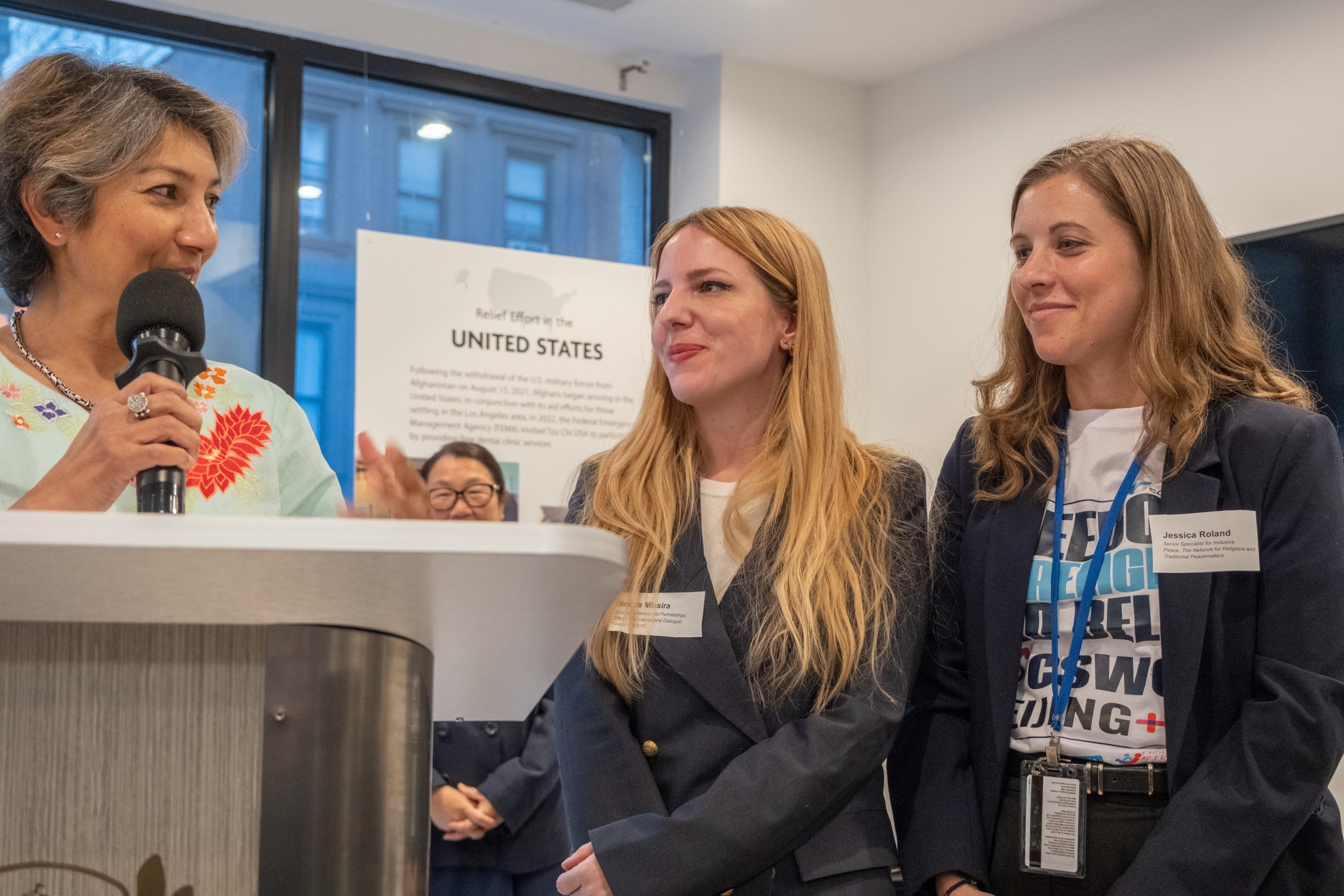
Ani Zonneveld, Founder and President of Muslims for Progressive Values (MPV), announcing Jessica Roland, Senior Inclusive Peace Specialist for the Network for Religious and Traditional Peacemakers, and Dimitra Missira, External Relations and Partnerships Officer at the Executive Office of the Secretary-General at the International Dialogue Centre – (KAICIID), as the new Co-Chairs of the MFAC Gender Working Group. March 2025.
Dr. Nkeiruka Didigu, Senior Strategic Partnerships Specialist at the United Nations Population Fund (UNFPA), delivered remarks on her engagement with faith actors at UNFPA. She expressed pride in the consensus adoption of the Political Declaration to kickoff the UN Commission on the Status of Women stating, “That sort of global consensus and agreement among Member States, that is the kind of momentum we need to take forward the mandate on gender equality.” She underscored the importance of investing in gender equality and supporting the advancement of women and girls, noting that, “Adequate investments would yield trillions in economic value and immeasurable social benefits.” Dr. Didigu called for increased partnerships with the UNFPA, recognizing the critical role that religious leaders play in their communities in fostering social change, and committed to revitalizing and strengthening these connections.
“Women have taken powerful strides forward and, as far as I’m concerned, we’re not going back.”
–Dr. Nkeiruka Didigu, Senior Strategic Partnerships Specialist at the United Nations Population Fund (UNFPA)
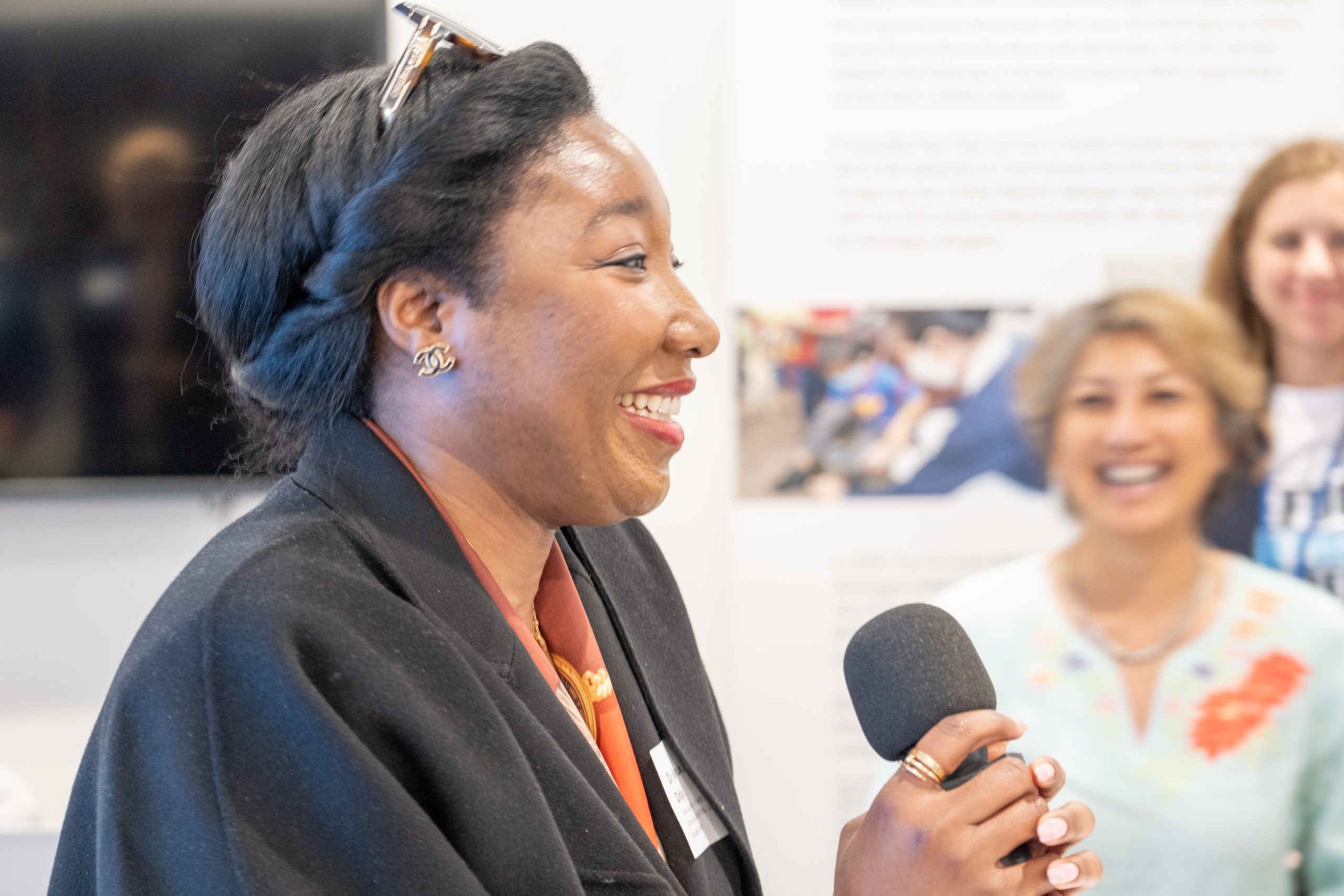
Dr. Nkeiruka Didigu, Senior Strategic Partnerships Specialist at the United Nations Population Fund (UNFPA), delivering high-level remarks during the High-Level Multi-Faith Reception. March 2025.
Rev. Dr. Uzoaku Juliana Williams, Assistant General Secretary of the LLP Christian Association of Nigeria, spoke about the Joint Initiative for Strategic Religious Action (JISRA) program and her experiences as the first woman in her leadership position. She emphasized the vital role that faith actors play in advancing gender equality and the importance of promoting best practices to combat discrimination and inequality. Discussing faith actors’ engagement at the grassroots level to challenge harmful norms, she stated, “many faith actors have successfully contextualized gender equality within religious traditions, making it more relatable and acceptable to their communities.” Rev. Williams concluded with a rousing call to question assumptions, listen to diverse perspectives, and critically challenge existing policies and practices.
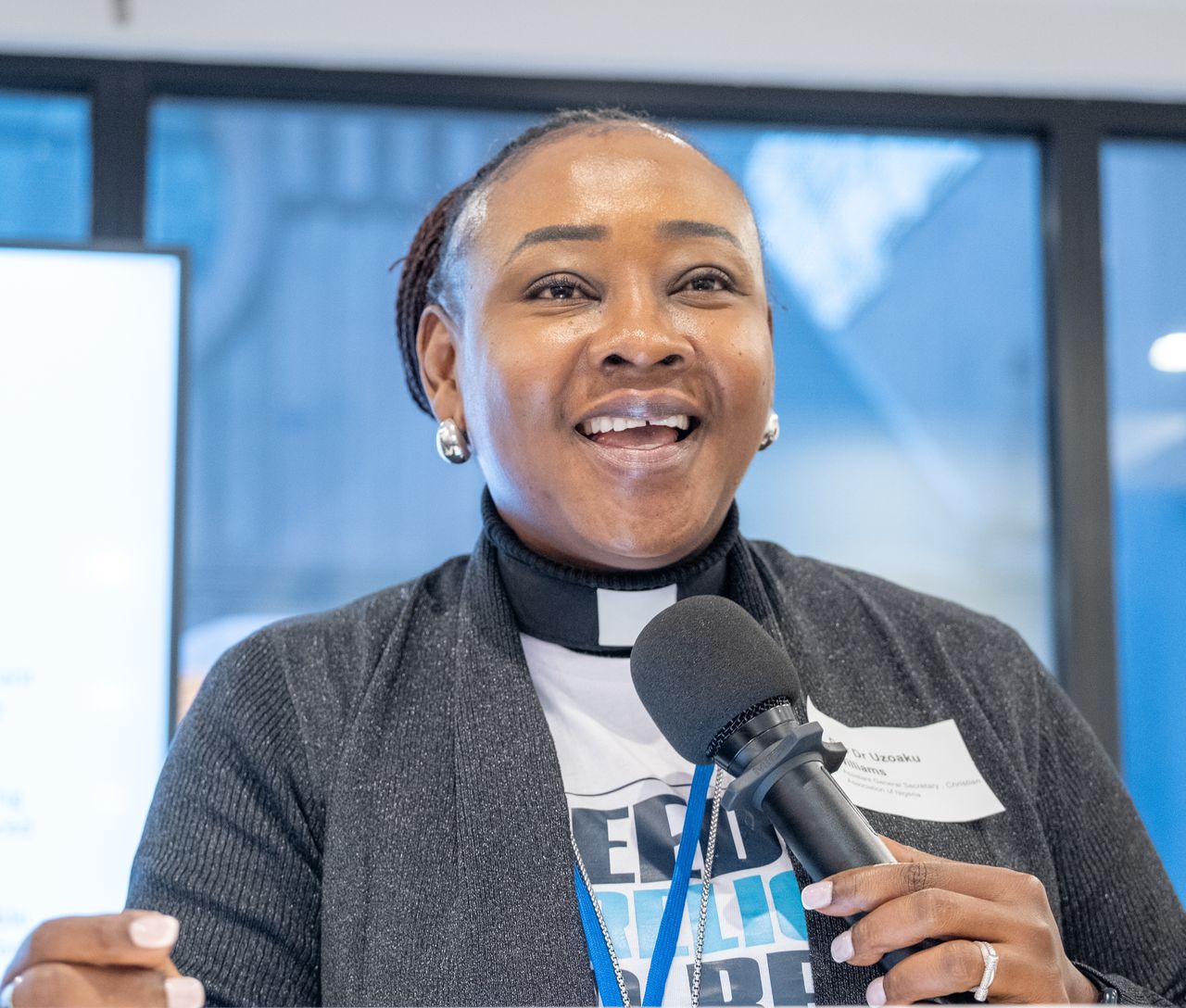
Rev. Dr. Uzoaku Juliana Williams, Assistant General Secretary of the LLP Christian Association of Nigeria, presenting her high-level remarks during the High-Level Multi-Faith Reception. March 2025.
“A more just and inclusive faith community requires effort and dedication from all of us.”
–Rev. Dr. Uzoaku Juliana Williams, Assistant General Secretary of the LLP Christian Association of Nigeria
Following, Dimitra Missira, External Relations and Partnerships Officer at the Executive Office of the Secretary-General at the KAICIID International Dialogue Centre, expressed her gratitude towards Ani and Alison for their dedicated work as co-chairs and looks forward to building upon their work as she assumes the MFAC Gender Working Group Co-Chair position. Missira emphasized the reception and broader networking opportunities are a vital opportunity to, “save the inclusive and collaborative spirit that we aspire to embody in our work towards the advancement of SDG 5 on gender equality and the empowerment of all women and girls.” She acknowledged the complexities of advancing gender equality, stating that it is neither straightforward nor guaranteed, and highlighted the importance of measuring progress in a rapidly changing world. Missira called for breaking down silos and fostering deeper collaboration to create multi-faith and multilateral partnerships, ensuring accountability to local communities and stakeholders to build a shared understanding of development literacy at the grassroots. In closing her remarks, she advocated for leveraging collective strengths, making shared commitments, combining resources, and championing diverse perspectives to support gender equality for all women and girls.
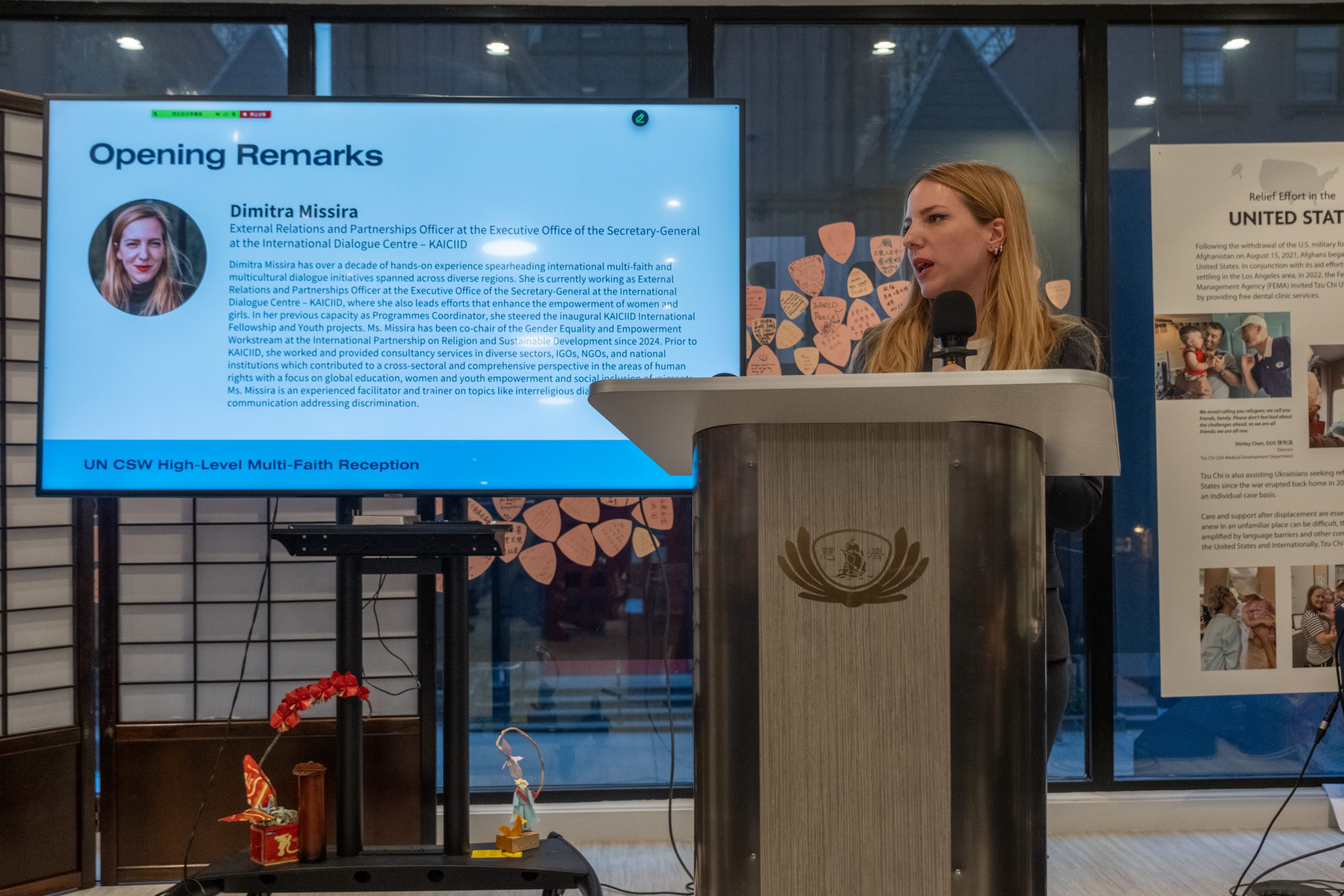
Dimitra Missira, External Relations and Partnerships Officer at the Executive Office of the Secretary-General at the International Dialogue Centre (KAICIID), delivering her remarks as the new Co-Chair for the MFAC Gender Working Group during the High-Level Multi-Faith Reception. March 2025.
“We need to reshape and transform global cooperation firmly grounded in the principles of human dignity and inclusivity.”
–Dimitra Missira, External Relations and Partnerships Officer at the Executive Office of the Secretary-General at the KAICIID International Dialogue Centre
In the event’s closing remarks, Rudelmar Bueno de Faria, General Secretary for ACT Alliance, congratulated both the previous and current chairs of the MFAC Gender Working Group, emphasizing its significance as the first Working Group of the MFAC and its consistent advocacy for gender equality beyond major events like the UN CSW. He addressed the challenges of engaging broader faith constituencies and praised the Working Group for its commitment to innovative strategies for promoting gender equality. Bueno de Faria specifically acknowledged Alison Kelly for her contributions within the ACT Alliance and the MFAC as she prepares to leave her position with the organization in May. He reiterated the value of using the MFAC Gender Working Group, “as a strategic way of engaging with multi-faith groups, and also with the UN.”
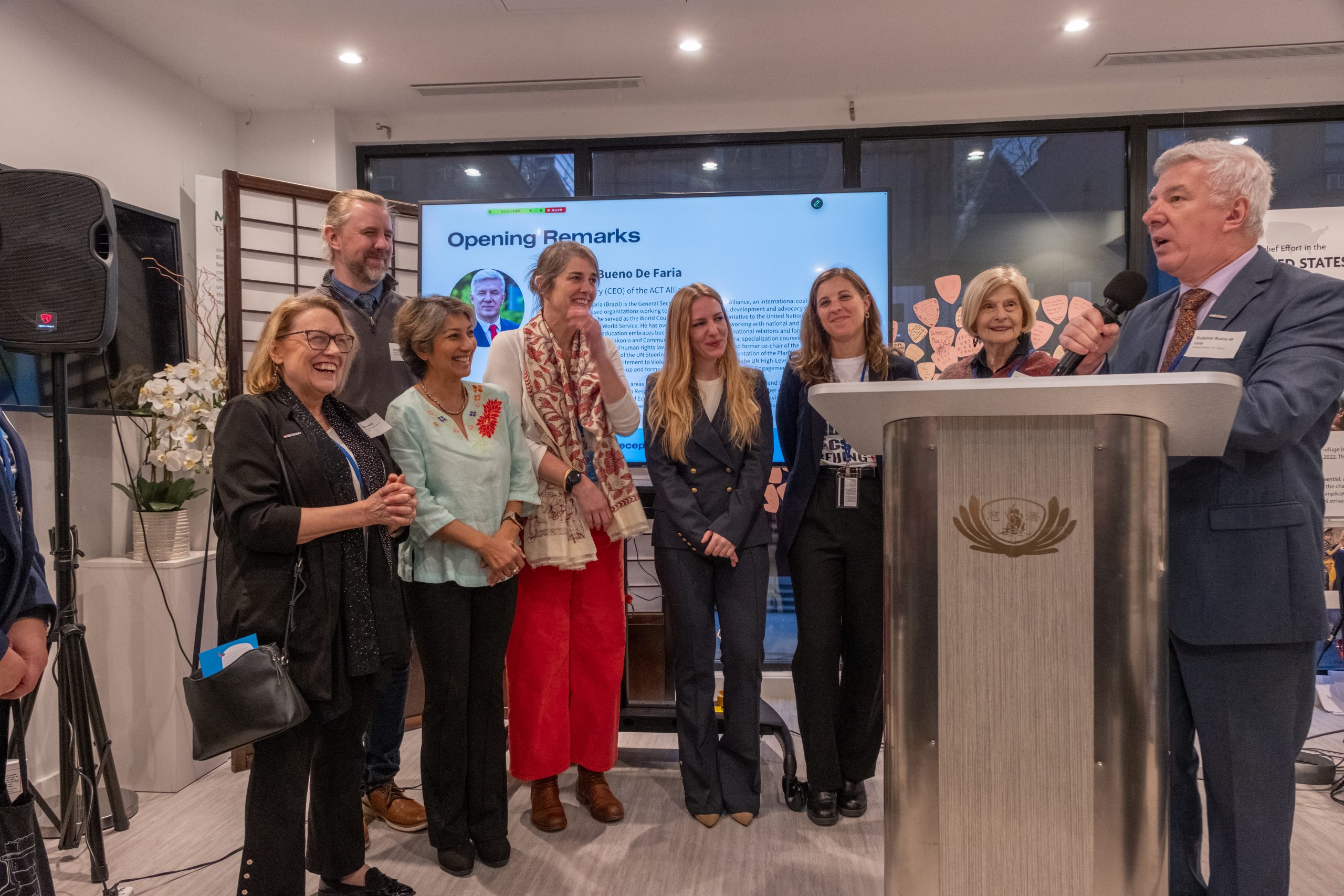
Rudelmar Bueno de Faria, General Secretary for ACT Alliance, delivering closing remarks and Alison’s farewell during the High-Level Multi-Faith Reception. March 2025.
About the UN Multi-Faith Advisory Council Gender Working Group
The Multi-Faith Advisory Council (MFAC) was established by the UN Inter-Agency Task Force on Religion and Sustainable Development (IATF-Religion) in September 2018. This informal and voluntary entity consists of a distinguished group of UN-accredited faith-based organizations reflecting the diversity of religious expressions with representation from around the world. To support gender justice as a primary initiative for MFAC, particularly concerning the empowerment of women and girls and its intersectionality, a Working Group was formed, comprising 13 organizations from various countries. The main objective of the Gender Working Group is to facilitate the implementation of the 2030 Agenda for Sustainable Development and beyond, ensuring that advancements in human rights are viewed through the lens of gender justice. This group also plays a crucial role in bridging the gap between the UN and faith-based organizations (FBOs), helping the UN understand how religion and religious beliefs influence its pillars, especially Sustainable Development Goal 5 (SDG 5). Learn more about the MFAC Gender Working Group and the intersection of faith and gender here.
Follow the Peacemakers Network on social
